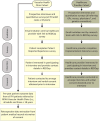Implementation of a primary-tertiary shared care model to improve the detection of familial hypercholesterolaemia (FH): a mixed methods pre-post implementation study protocol
- PMID: 38692720
- PMCID: PMC11086381
- DOI: 10.1136/bmjopen-2023-082699
Implementation of a primary-tertiary shared care model to improve the detection of familial hypercholesterolaemia (FH): a mixed methods pre-post implementation study protocol
Abstract
Introduction: Familial hypercholesterolaemia (FH) is an autosomal dominant inherited disorder of lipid metabolism and a preventable cause of premature cardiovascular disease. Current detection rates for this highly treatable condition are low. Early detection and management of FH can significantly reduce cardiac morbidity and mortality. This study aims to implement a primary-tertiary shared care model to improve detection rates for FH. The primary objective is to evaluate the implementation of a shared care model and support package for genetic testing of FH. This protocol describes the design and methods used to evaluate the implementation of the shared care model and support package to improve the detection of FH.
Methods and analysis: This mixed methods pre-post implementation study design will be used to evaluate increased detection rates for FH in the tertiary and primary care setting. The primary-tertiary shared care model will be implemented at NSW Health Pathology and Sydney Local Health District in NSW, Australia, over a 12-month period. Implementation of the shared care model will be evaluated using a modification of the implementation outcome taxonomy and will focus on the acceptability, evidence of delivery, appropriateness, feasibility, fidelity, implementation cost and timely initiation of the intervention. Quantitative pre-post and qualitative semistructured interview data will be collected. It is anticipated that data relating to at least 62 index patients will be collected over this period and a similar number obtained for the historical group for the quantitative data. We anticipate conducting approximately 20 interviews for the qualitative data.
Ethics and dissemination: Ethical approval has been granted by the ethics review committee (Royal Prince Alfred Hospital Zone) of the Sydney Local Health District (Protocol ID: X23-0239). Findings will be disseminated through peer-reviewed publications, conference presentations and an end-of-study research report to stakeholders.
Keywords: cardiovascular disease; genetics; implementation science; patient-centered care; primary care.
© Author(s) (or their employer(s)) 2024. Re-use permitted under CC BY-NC. No commercial re-use. See rights and permissions. Published by BMJ.
Conflict of interest statement
Competing interests: DS has received grants from Regeneron, Amgen, Arrowhead, Ionis and Novartis via Sydney Local Health District; consulting fees and speaker fees from Amgen and Novartis; and drug samples for a treatment adherence programme from Sanofi. CMH has received Amgen, Sanofi and MRFF grants looking at FH identification in the general practice setting, and assisted in the Amgen-funded independent education design for the GP. MNS is supported by an NHMRC Investigator Grant and received honoraria related to consulting, research and/or speaker activities from Amgen.
Figures


Similar articles
-
Detection and management of familial hypercholesterolaemia in primary care in Australia: protocol for a pragmatic cluster intervention study with pre-post intervention comparisons.BMJ Open. 2017 Oct 22;7(10):e017539. doi: 10.1136/bmjopen-2017-017539. BMJ Open. 2017. PMID: 29061621 Free PMC article. Clinical Trial.
-
Family planning, pregnancy, and breastfeeding care in familial hypercholesterolaemia: a study protocol for a mixed-methods study in the Netherlands, Norway and Australia (Taking ACTion to Improve Care of coupleS in FH (TACTICS)).BMJ Open. 2025 Mar 3;15(3):e089187. doi: 10.1136/bmjopen-2024-089187. BMJ Open. 2025. PMID: 40032366 Free PMC article.
-
Developing and Optimizing Innovative Tools to Address Familial Hypercholesterolemia Underdiagnosis: Identification Methods, Patient Activation, and Cascade Testing for Familial Hypercholesterolemia.Circ Genom Precis Med. 2021 Feb;14(1):e003120. doi: 10.1161/CIRCGEN.120.003120. Epub 2021 Jan 22. Circ Genom Precis Med. 2021. PMID: 33480803 Free PMC article.
-
Screening for familial hypercholesterolaemia in primary care: Time for general practice to play its part.Atherosclerosis. 2018 Oct;277:399-406. doi: 10.1016/j.atherosclerosis.2018.08.019. Atherosclerosis. 2018. PMID: 30270077 Review.
-
Optimising the detection and management of familial hypercholesterolaemia: central role of primary care and its integration with specialist services.Heart Lung Circ. 2014 Dec;23(12):1158-64. doi: 10.1016/j.hlc.2014.07.062. Epub 2014 Aug 1. Heart Lung Circ. 2014. PMID: 25130889 Review.
Cited by
-
Process for mainstreaming genetic cascade testing into primary and tertiary health systems in familial hypercholesterolaemia (FH), an autosomal dominant, fully penetrant disorder.Fam Med Community Health. 2025 Aug 14;13(3):e003258. doi: 10.1136/fmch-2024-003258. Fam Med Community Health. 2025. PMID: 40813103 Free PMC article.
References
-
- Nordestgaard BG, Chapman MJ, Humphries SE, et al. . Familial Hypercholesterolaemia is Underdiagnosed and Undertreated in the general population: guidance for Clinicians to prevent coronary heart disease: consensus statement of the European Atherosclerosis society. Eur Heart J 2013;34:3478–90a. 10.1093/eurheartj/eht273 - DOI - PMC - PubMed
Publication types
MeSH terms
LinkOut - more resources
Full Text Sources
Miscellaneous
